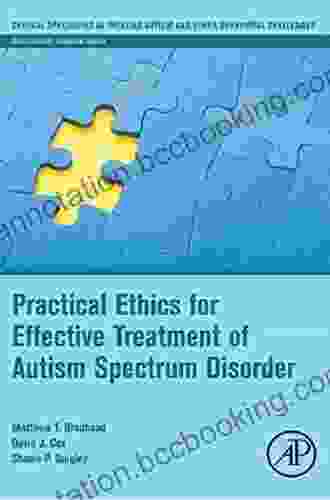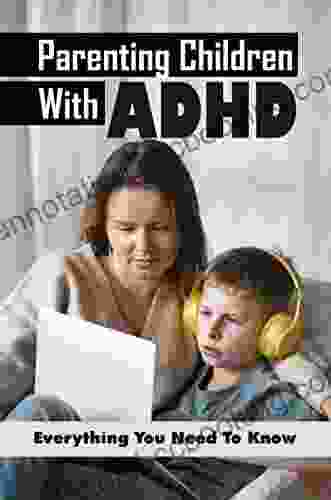Practical Ethics for Effective Treatment of Autism Spectrum Disorder: A Critical Guide

Autism spectrum disFree Download (ASD) is a complex neurodevelopmental condition that affects an individual's social and communication skills, as well as their behavior. Treating ASD can be challenging, and it is essential that professionals approach their work with a strong understanding of ethical principles.
This guide provides an overview of the ethical issues that professionals may encounter when treating individuals with ASD. It covers topics such as confidentiality, informed consent, and the use of restrictive interventions. The guide also provides practical tips on how to apply ethical principles in practice.
The following ethical principles are essential for professionals to consider when treating individuals with ASD:
4.8 out of 5
| Language | : | English |
| File size | : | 1887 KB |
| Text-to-Speech | : | Enabled |
| Screen Reader | : | Supported |
| Enhanced typesetting | : | Enabled |
| Word Wise | : | Enabled |
| Print length | : | 127 pages |
- Respect for autonomy: Individuals with ASD have the right to make their own decisions about their treatment. Professionals should respect their choices, even if they do not agree with them.
- Beneficence: Professionals should act in the best interests of their clients. This means providing treatment that is likely to benefit them and avoiding treatments that are likely to cause harm.
- Non-maleficence: Professionals should avoid causing harm to their clients. This means using treatments that are safe and effective, and avoiding treatments that are likely to cause pain or distress.
- Justice: Professionals should treat all of their clients fairly and equitably. This means providing access to the same quality of care regardless of their race, gender, socioeconomic status, or other factors.
The following are some practical tips on how to apply ethical principles to practice when treating individuals with ASD:
- Obtain informed consent from clients: Before starting any treatment, professionals should obtain informed consent from their clients. This means providing them with clear and concise information about the treatment, including its risks and benefits.
- Respect client confidentiality: Professionals should keep all client information confidential. This means not sharing it with anyone else without the client's consent.
- Use restrictive interventions only when necessary: Restrictive interventions, such as physical restraint or seclusion, should only be used as a last resort. Professionals should always consider less restrictive interventions first.
- Be aware of your own biases: Professionals should be aware of their own biases and how they might affect their work with clients. They should take steps to minimize the impact of their biases on their treatment decisions.
- Seek consultation when needed: Professionals should not hesitate to seek consultation from other professionals when they are facing ethical dilemmas. Consultation can help professionals to make the best decisions for their clients.
Ethical principles are essential for professionals to consider when treating individuals with ASD. By following the principles outlined in this guide, professionals can provide effective and compassionate care that respects the rights and dignity of their clients.
4.8 out of 5
| Language | : | English |
| File size | : | 1887 KB |
| Text-to-Speech | : | Enabled |
| Screen Reader | : | Supported |
| Enhanced typesetting | : | Enabled |
| Word Wise | : | Enabled |
| Print length | : | 127 pages |
Do you want to contribute by writing guest posts on this blog?
Please contact us and send us a resume of previous articles that you have written.
 Book
Book Novel
Novel Page
Page Chapter
Chapter Text
Text Story
Story Genre
Genre Reader
Reader Library
Library Paperback
Paperback E-book
E-book Magazine
Magazine Newspaper
Newspaper Paragraph
Paragraph Sentence
Sentence Bookmark
Bookmark Shelf
Shelf Glossary
Glossary Bibliography
Bibliography Foreword
Foreword Preface
Preface Synopsis
Synopsis Annotation
Annotation Footnote
Footnote Manuscript
Manuscript Scroll
Scroll Codex
Codex Tome
Tome Bestseller
Bestseller Classics
Classics Library card
Library card Narrative
Narrative Biography
Biography Autobiography
Autobiography Memoir
Memoir Reference
Reference Encyclopedia
Encyclopedia Kenneth V Jack
Kenneth V Jack Courtney Mayer
Courtney Mayer Asato Asato
Asato Asato Mary Mccarthy
Mary Mccarthy William Rosenberg
William Rosenberg Iain R Thomson
Iain R Thomson Paul Rooyackers
Paul Rooyackers Anne H Berry
Anne H Berry Daniel A Sjursen
Daniel A Sjursen Jim Brown
Jim Brown Mia Bowen
Mia Bowen Ash Davidson
Ash Davidson David J Cox
David J Cox David H Ross
David H Ross Daniel Dell Uomo
Daniel Dell Uomo Jeremy J Baumberg
Jeremy J Baumberg J Michael Dumoulin
J Michael Dumoulin Alec L Miller
Alec L Miller Jude Deveraux
Jude Deveraux Conrad Bauer
Conrad Bauer
Light bulbAdvertise smarter! Our strategic ad space ensures maximum exposure. Reserve your spot today!

 Herbert CoxHollywood's Not-So-Secret Society: Unveiling the World of 'Hollywood Gays' by...
Herbert CoxHollywood's Not-So-Secret Society: Unveiling the World of 'Hollywood Gays' by...
 Craig CarterUnveiling Philip Roth's "Conversion of the Jews": A Comprehensive Study Guide...
Craig CarterUnveiling Philip Roth's "Conversion of the Jews": A Comprehensive Study Guide... Eugene PowellFollow ·7.9k
Eugene PowellFollow ·7.9k Henry HayesFollow ·6.3k
Henry HayesFollow ·6.3k Marcus BellFollow ·7.2k
Marcus BellFollow ·7.2k Albert ReedFollow ·18.6k
Albert ReedFollow ·18.6k Marc FosterFollow ·19.4k
Marc FosterFollow ·19.4k Edwin CoxFollow ·17.5k
Edwin CoxFollow ·17.5k Oliver FosterFollow ·13.8k
Oliver FosterFollow ·13.8k Juan RulfoFollow ·9.7k
Juan RulfoFollow ·9.7k

 Voltaire
VoltaireStories From The Jim Crow Museum: Unveiling the Haunting...
A Journey into the Depths of...

 F. Scott Fitzgerald
F. Scott FitzgeraldCalling Sorcery And Society: Illuminating the...
: The Alluring Embrace of Sorcery ...

 Marcel Proust
Marcel ProustBranding Bud: Unveiling the Green Rush
As the legalization...

 Henry Wadsworth Longfellow
Henry Wadsworth LongfellowColorful Dreamer: The Story of Artist Henri Matisse
Henri Matisse was a French artist...

 Adrian Ward
Adrian WardDelving into the Tapestry of Black British Identity: A...
In the realm of historical...
4.8 out of 5
| Language | : | English |
| File size | : | 1887 KB |
| Text-to-Speech | : | Enabled |
| Screen Reader | : | Supported |
| Enhanced typesetting | : | Enabled |
| Word Wise | : | Enabled |
| Print length | : | 127 pages |










